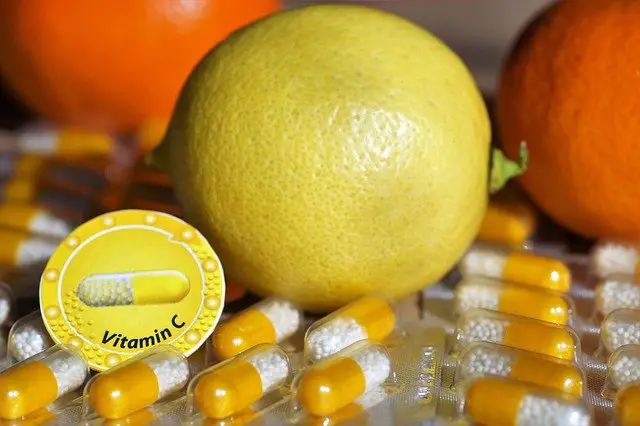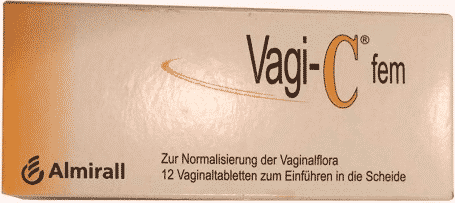250mg vaginal Vitamin C once daily for 6 days (after your period) treats BV by lowering vaginal pH to 4.5 and increasing acidification, which inhibits the growth of anaerobic bacteria.
Lactobacilli is the “good” vaginal flora, it is responsible for mantaining the normal vaginal pH. BV happens when Lactobacilli are decreased. This causes a decrease in hydrogen peroxide and a raise on vaginal pH, which decreases vaginal acidity. This promotes the growth of the anaerobic bacteria Gardnerella vaginalis, which grow optimally with a pH of 6 – 7.
Vaginal vitamin C increases vaginal acidification and lowers the pH closer to 4.5, which inhibits the growth of this bacteria, thereby making up for the reduction in the number of lactobacilli present.
The video below shows how Vitamin C can work alongside against antibiotics for bacterial vaginal infections.
BV not going away with antibiotics?
Antibiotics are the primary method of treatment for BV, however many women still present symptoms of BV after taking antibiotics. BV can often arise as a recurrent disease. The reason for this recurrence is not well known. If a patient presents recurrent symptoms, a second treatment of antibiotics is often prescribed. Studies have shown that vitamin C may be a useful treatment in reducing the recurrence rate for antibiotic resistant BV.
Still having discharge after BV treatment?
Up to 80% of women are still having discharge after BV treatment with antibiotics. This means you should finish your treatment even if there are no more symptoms present.
According to two studies, Vitamin C for BV might be an alternative treatment for antibiotic resistant BV.
Study 1
- Title: Efficacy of vitamin C vaginal tablets in the treatment of bacterial vaginosis: a randomized, double blind, placebo controlled clinical trial.
- Length: 6 days.
Subject Information
- Number of Subjects: 277.
- Gender: female
- Health Status: bacterial vaginosis.
Method used
This study was made to test the safety and efficacy of 250 mg ascorbic acid (Vitamin C, with the product named Vagi C) in women with bacterial vaginosis (BV). Patients had three or more of the following sympyoms:
- White discharge
- pH of vaginal fluid > 4.5
- A fish-like odor of vaginal discharge before or after addition of 10% Potassium hydroxide (KOH)
- Presence of clue cells (covered with bacteria) on microscopic examination
Patients were on the control group applied a tablet deeply into the vagina once a day for 6 days.
Results
55.3% of patients with Vitamin C wered cured, and 25.7% of patients with placebo were cured. The difference between-groups was 29.6%.
Both Vitamin C and placebo were well tolerated and no differences in safety were seen between groups.
Conclusion
Vitamin C for BV vaginal tablets are effective and safe in the treatment of this condition.
Study 2
- Title: Efficacy of Vitamin C Vaginal Tablets as Prophylaxis for Recurrent Bacterial Vaginosis: A Randomised, Double-Blind, Placebo-Controlled Clinical Trial.
- Length: 6 months.
Subject Information
- Number of Subjects: 142.
- Gender: female
- Health Status: BV.
Method used
This study was performed to test the effect of vitamin C in the treatment of chronic BV. The patients, after having been cured of a recent episode of BV by antobiotics, received vitamin C (74 patients) or placebo (68 patients) as a treatment for six months. The patients applied one vaginal tablet once a day for 6 consecutive days per month after their period.
Results
The rate of BV recurrence during the first 3 months was:
- Vitamin C group: (6.8%)
- Placebo group: (14.7%)
Within a 6 month treatment period, the recurrence rate was:
- Vitamin C group (16.2%)
- Placebo group (32.4%)
Conclusions
The study shows that the use of 250 mg Vitamin C for BV (ascorbic acid vaginal tablets) on 6 days per month for 6 months after successful treatment of bacterial vaginosis halves the risk of recurrence from 32.4% to 16.2%.
The following study shows the effects of Vitamin C vaginal tables for non specific Vaginitis (inflammation that can be caused by BV).
Study 3
- Title: Efficacy and safety of vitamin C vaginal tablets in the treatment of non-specific vaginitis. A randomised, double blind, placebo-controlled study.
- Length: 20 days (including a treatment phase of 6 days).
Subject Information
- Number of Subjects: 100 (50 placebo, 50 vitamin c).
- Age: 18 or older.
- Gender: female
- Health Status: vaginitis.
Method used
This study was performed to test the efficacy and safety of vitamin C vaginal tablets (250 mg) given once a day in the treatment of non-specific vaginitis. 1 and 2 weeks after the end of treatment, patients were tested for the presence of at least 3 out of these 4 symptoms:
- Discharge
- Fish-like smell
- Vaginal pH >/= 4.7
- Presence of clue cells (covered with bacteria) on microscopic examination
Secondary symptoms included:
- Pruritus (itch)
- Fever
- Superinfections
- Microscopic findings on vaginal smear
- Colposcopy (examination of the vagina for disease)
Results
The four main symptoms showed a significant decrease between the control group and the placebo group. Below is the percentage of patients that were still affected by non-specific vaginitis after treatment:
- 35.7% of patients treated with placebo
- 14.0% of patients treated with Vitamin C tablets
The microscopic examination of vaginal smear, showed and increased efficacy in the Vitamin C treated group. The clue cells disappeared in:
- 79% of patients treated with Vitamin C tablets
- 53% of patients treated with placebo
Bacteria disappeared in:
- 77% of patients treated with Vitamin C tablets
- 54% of patients treated with placebo
Lactobacilli (good vaginal flora) reappeared in:
- 79.1% of patients treated with Vitamin C tablets
- 53.3% of patients treated with placebo
1 week after vitamin C discontinuation, Vaginal pH values decreased in both groups. The rate of subjects with pH >/= 4.7 was significantly lesser in the Vitamin C group:
- 16.3% of patients treated with Vitamin C tablets
- 38.6% of patients treated with placebo
Want To Know More?
Click the links below to access the individual topic pages:
Sources
This article makes use of information from the U.S. National Library of Medicine under the terms of the Creative Commons Attribution 4.0 International License.
- Petersen EE, Genet M, Caserini M, Palmieri R. Efficacy of vitamin C vaginal tablets in the treatment of bacterial vaginosis: a randomised, double blind, placebo controlled clinical trial. Arzneimittelforschung. 2011;61(4):260-265. doi:10.1055/s-0031-1296197
- https://www.ncbi.nlm.nih.gov/pmc/articles/PMC3712888/
- Kairys N, Garg M. Bacterial Vaginosis. [Updated 2020 Jul 10]. In: StatPearls [Internet]. Treasure Island (FL): StatPearls Publishing; 2020 Jan-. Available from: https://www.ncbi.nlm.nih.gov/books/NBK459216/
- Petersen EE, Magnani P. Efficacy and safety of vitamin C vaginal tablets in the treatment of non-specific vaginitis. A randomised, double blind, placebo-controlled study. Eur J Obstet Gynecol Reprod Biol. 2004 Nov 10;117(1):70-5. doi: 10.1016/j.ejogrb.2004.02.032. PMID: 15474248.



